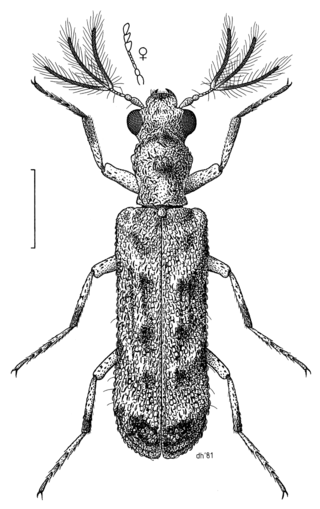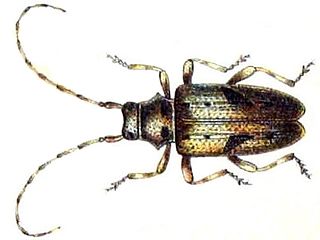
Hippodamia is a genus of ladybirds in the family Coccinellidae. It includes the most common native North American "ladybug", H. convergens, which can form overwintering aggregations numbering in the millions. Another notable member is Hippodamia variegata, which occurs widely over both the North and South Hemispheres.

The Bostrichidae are a family of beetles with more than 700 described species. They are commonly called auger beetles, false powderpost beetles, or horned powderpost beetles. The head of most auger beetles cannot be seen from above, as it is downwardly directed and hidden by the thorax. Exceptions are the powderpost beetles, and members of the subfamily Psoinae.

Johann August Ephraim Goeze was a German zoologist, born in Aschersleben. He is known for the discovery of tardigrades, also called water bears. He was the son of Johann Heinrich and Catherine Margarete. He studied theology at University of Halle. He married Leopoldine Maria Keller in 1770, by whom he had four children. In 1751, he became a pastor in Aschersleben, in Quedlinburg, and later of St. Blasius' Church in Quedlinburg in 1762, finally becoming first deacon of the seminary of Quedlinburg in 1787. He died in Quedlinburg.

Lyctus is a genus of powder-post beetles in the family Bostrichidae, being present on all continents except Antarctica.

Johann Melchior Goeze was a Lutheran pastor and theologian during the period of Late Orthodoxy. From 1760 to 1770 he served as senior of Hamburg presiding as spiritual leader over the Lutheran state church of the city-state.

Hylobius transversovittatus is a species of weevil in the family Curculionidae. It is native to the Old World where both adults and larvae feed on purple loosestrife. This plant is regarded as an invasive species in North America and the weevil has been introduced into both the United States and Canada in an effort to control the plant.

Cheilotoma is a genus of beetles in the subfamily Cryptocephalinae of the leaf beetles family.

Exochomus is a genus of beetle of the family Coccinellidae.

Calathus fuscipes is a species of ground beetle from the Platyninae subfamily that can be found everywhere in Europe except for Andorra, Monaco, San Marino, Vatican City and various islands.

Pogonocherus is a genus of flat-faced longhorn beetles in the family Cerambycidae.
Dorcadion glycyrrhizae is a species of beetle in the family Cerambycidae. It was described by Pallas in 1773.

Pogonocherus ovatus is a species of beetle in the family Cerambycidae. It was described by Johann August Ephraim Goeze in 1777, originally under the genus Cerambyx. It has a wide distribution throughout Europe, although it has become extinct in several countries, including Luxembourg, Belgium and the Netherlands. It measures between 4 and 6 mm. It contains the varietas Pogonocherus ovatus var. subovatus.
Phytoecia rubropunctata is a species of beetle in the family Cerambycidae. It was described by Johann August Ephraim Goeze in 1777, originally under the genus Leptura. It is known from Germany, France, Spain, and Italy. It measures between 8 and 14 mm. It feeds on Trinia glauca.

Liparus coronatus is a species of beetles belonging to the family Curculionidae.

Scymnus is a genus of beetle in the family Coccinellidae. It is the type genus of the subfamily Scymninae and the tribe Scymnini.

Omonadus is a genus of antlike flower beetles in the family Anthicidae. There are about seven described species in Omonadus.

Lesteva longoelytrata is a species of beetle belonging to the family Staphylinidae.
Liparus is a genus of beetles belonging to the family Curculionidae. The species of this genus are found in Europe.















